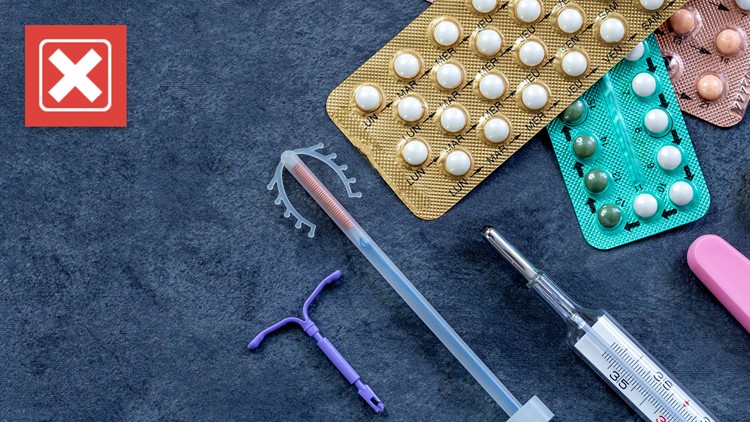National Infertility Awareness Week (NIAW) is April 21 to April 27.
Infertility is generally defined as not being able to get pregnant after one year, or longer, of unprotected sex. NIAW was founded in 1989 by RESOLVE: The National Infertility Association to change the conversation around infertility.
Multiple social posts over the years have claimed birth control can cause infertility. Birth control, which is also called contraception, is the use of medicines, devices or surgery to prevent pregnancy.
Recent online search trends show many people are wondering if birth control causes infertility.
THE QUESTION
Does birth control cause infertility?
THE SOURCES
- Centers for Disease Control and Prevention
- Beaufort Memorial Hospital in Beaufort, South Carolina
- Cleveland Clinic
- Piedmont Healthcare
- Tiffany Bersani, M.D., obstetrics and gynecology specialist at Beaufort Memorial Obstetrics and Gynecology Specialists
- Miriam Cremer, M.D., women’s health specialist at the Cleveland Clinic
- Lisa Hasty, M.D., retired reproductive endocrinologist and infertility specialist in Atlanta, Georgia
- Aaron Lazorwitz, M.D., Ph.D., assistant professor of obstetrics, gynecology and reproductive sciences at the Yale School of Medicine
- An article by Jen Gunter, M.D., OB/GYN and pain medicine physician
- A study published in Human Reproduction, a peer-reviewed scientific journal
- A study published in Contraception and Reproductive Medicine, a peer-reviewed scientific journal
THE ANSWER
No, birth control does not cause infertility.
WHAT WE FOUND
All of our sources agree that birth control does not cause infertility.
“Using hormonal birth control doesn’t affect your ability to have a baby in the future,” said Miriam Cremer, M.D., a women’s health specialist at the Cleveland Clinic.
Aaron Lazorwitz, M.D., an assistant professor of obstetrics, gynecology and reproductive sciences at the Yale School of Medicine, agrees.
“This rumor and myth has kind of been around for quite a while in different shapes and forms, and thankfully, it is not true,” Lazorwitz told VERIFY. “The birth control methods we use nowadays do not cause infertility.”
There are multiple forms of birth control, and many contain one or more hormones, such as estrogen or progestin, according to the Cleveland Clinic. Some are short-acting, like birth control pills. Others are long-acting, like intrauterine devices (IUDs), implants and the birth control shot, which is sometimes called Depo-Provera, the Depo shot or DMPA.
None of these birth control methods make you infertile or negatively impact your future ability to get pregnant after you stop taking them or have them removed, the Cleveland Clinic says.
“Once the birth control is out of your system, your fertility returns,” said Cremer.
However, one exception is the shot, Cremer and Tiffany Bersani, M.D., an OB/GYN at Beaufort Memorial Obstetrics and Gynecology Specialists, both noted.
“The shots give a large dose of progestin that’s intended to prevent pregnancy for 12 or 13 weeks,” Cremer explained. “But after stopping the shots, it can take anywhere from three months to over two years for fertility and ovulation to fully return to normal.”
A 2013 study, co-authored by researchers from the Boston University School of Public Health, found that long-term use of oral contraceptives, like the birth control pill, does not hurt a person’s chances of becoming pregnant after they stop using contraception.
Another study from 2018 also found that birth control, regardless of its duration and type, does not hurt a person’s ability to get pregnant after they stop using it, nor does it significantly delay fertility.
For people who stop using birth control and experience infertility, it’s possible another underlying health issue is causing the problem.
The Cleveland Clinic says birth control is often used as a treatment for certain health issues that cause infertility, including:
- Polycystic ovary syndrome (PCOS): a hormone imbalance that often interferes with ovulation.
- Uterine fibroids: benign (noncancerous) tumors that grow in the lining of your uterus.
- Endometriosis: a condition where uterine tissue grows outside your uterus.
- Unexplained infertility: where healthcare providers can’t identify the reason you can’t get pregnant.
- Other health issues such as infections, tumors and autoimmune diseases.
“It’s possible that being on birth control could hide other health problems that affect your fertility — like irregular periods and symptoms of PCOS and endometriosis,” the Cleveland Clinic says.
“So, while you’re on the pill (or the patch or the shot, or whatever your hormonal birth control method of choice), it may seem as if everything is in working order. But you might not know if your periods come irregularly or if you have pain from endometriosis until you go off birth control and try to get pregnant,” the Cleveland Clinic added.
Other factors can also affect fertility, such as age, genetics and weight, according to Beaufort Memorial Hospital and the CDC.
“If you stop taking the pill after several years and find it difficult to get pregnant, it may be more likely related to your age and not your years of contraceptive use,” said Bersani.
Beaufort Memorial says that lifestyle can also have an impact on a person’s ability to conceive. Consuming too much alcohol or caffeine, for example, can have an adverse effect on hormone production, according to the hospital. Studies have also found that smoking may drastically affect a person’s chances of getting pregnant.
“Smoking can have a major impact on fertility. Cigarette smoke — even secondhand smoke — can be disruptive to your hormones,” said Bersani.
If you have questions about birth control or fertility, you should reach out to a healthcare provider who can help.
This story is also available in Spanish / Lee este artículo también en español: No, los anticonceptivos no causan infertilidad



